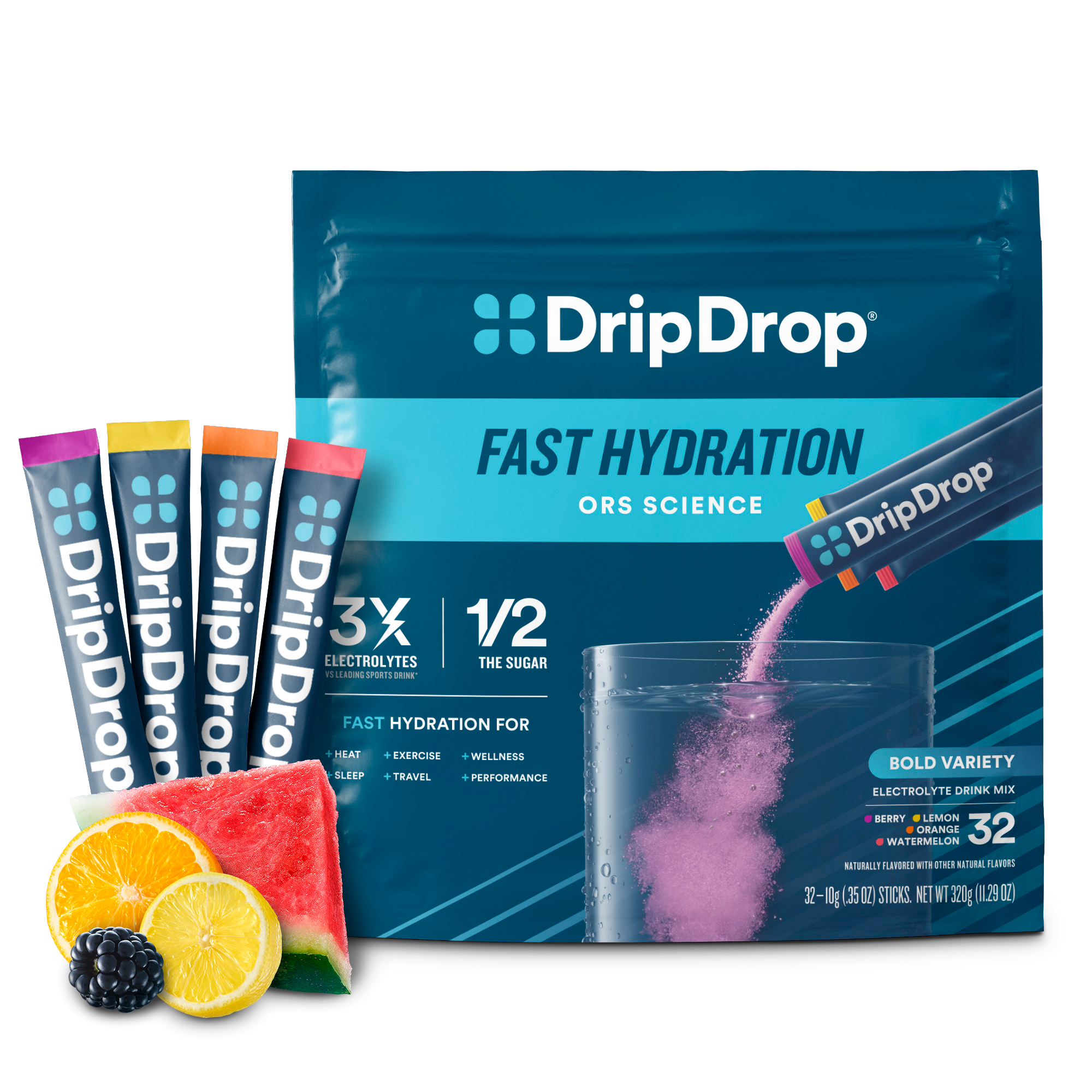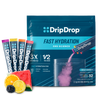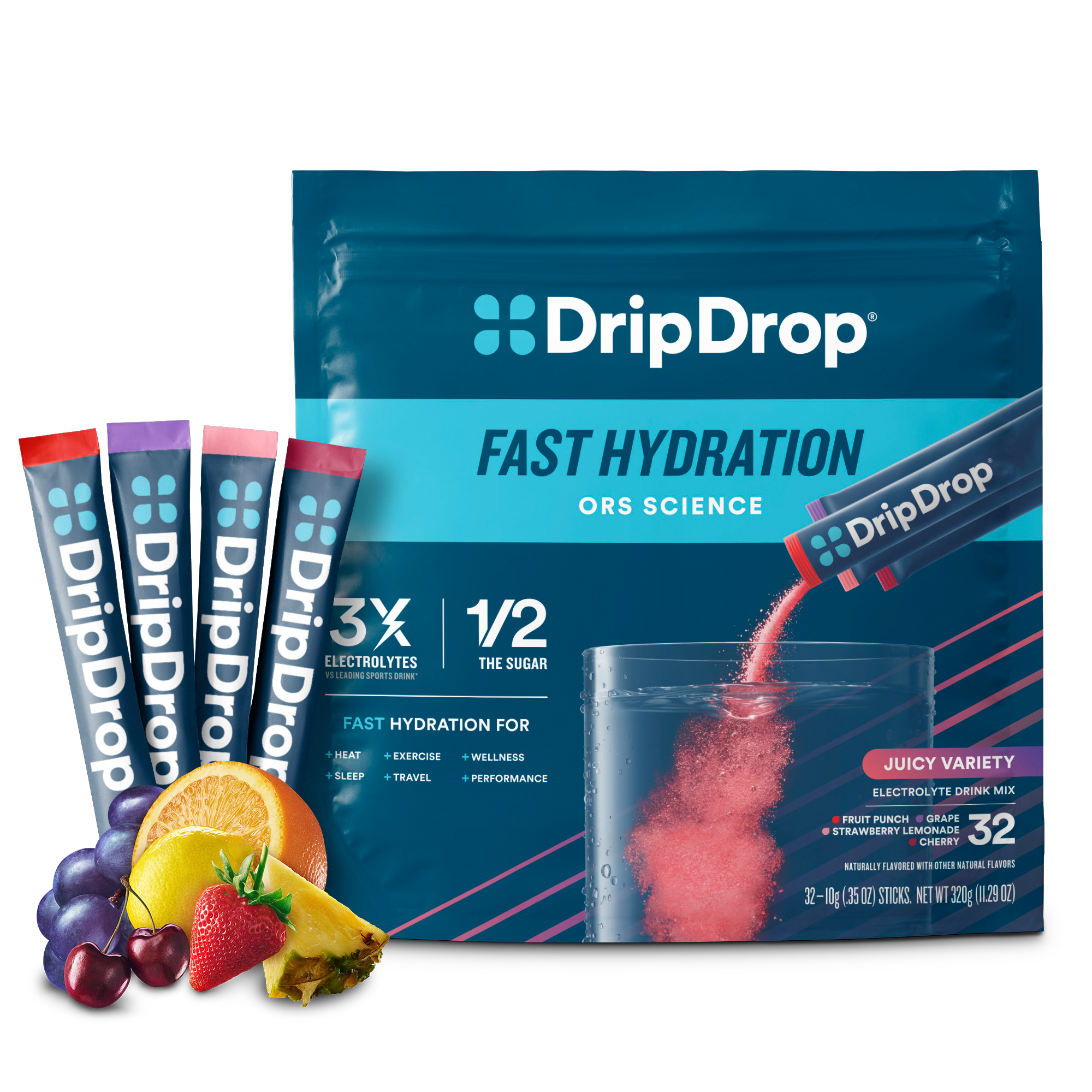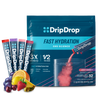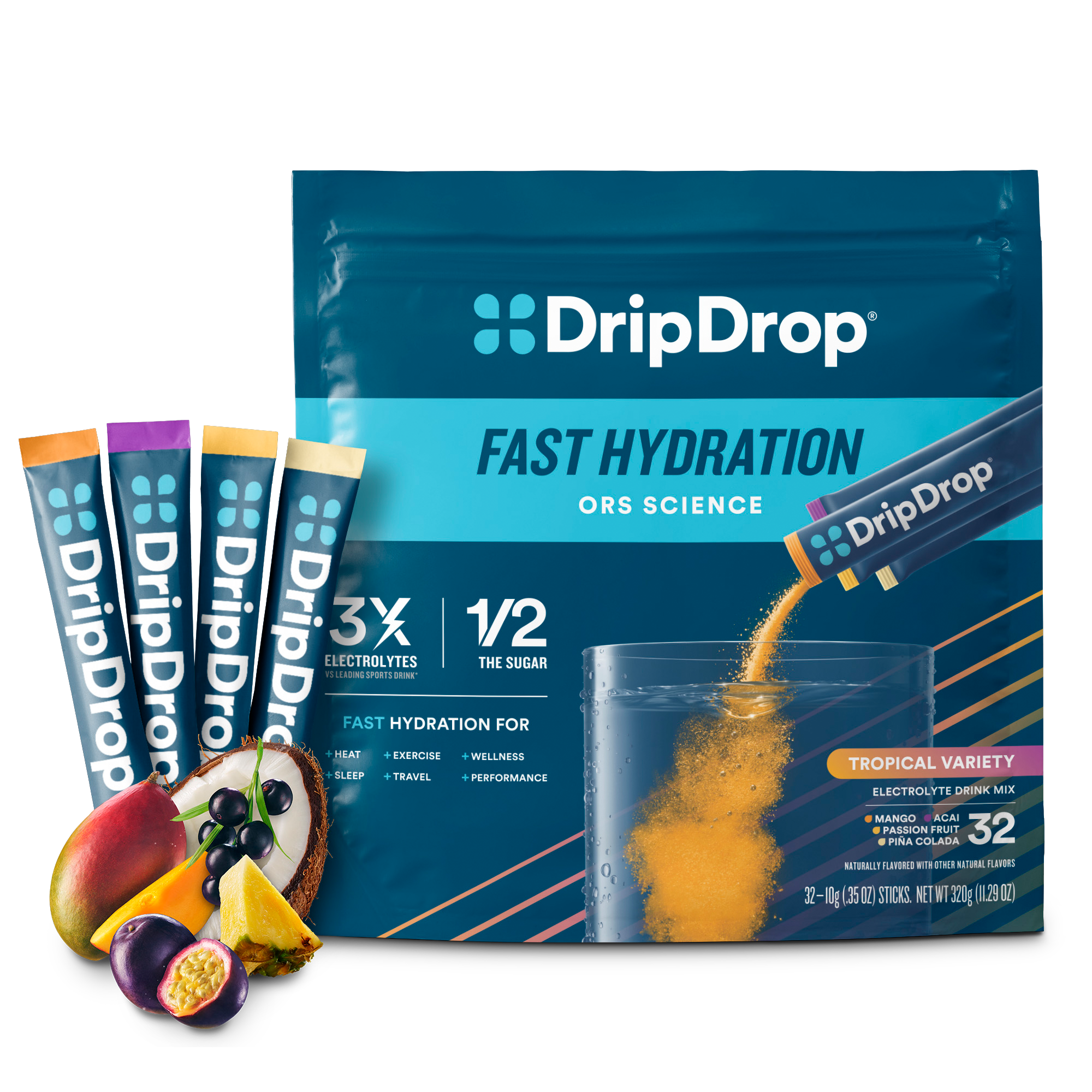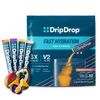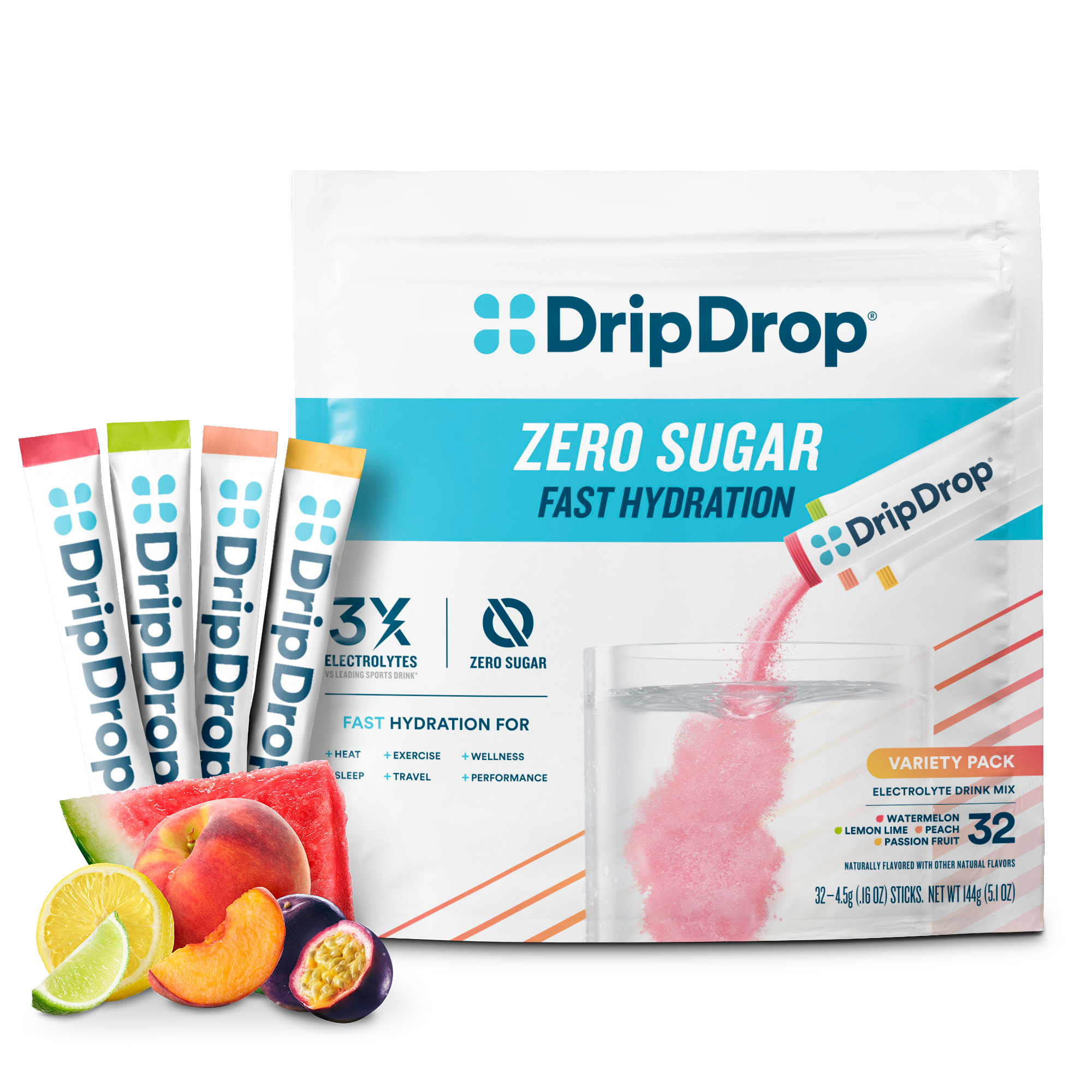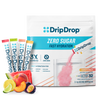Here, we’ll show you the latest research on the effects of caffeine on hydration. Plus, you’ll learn how you can manage dehydration year-round using an oral rehydration solution like DripDrop. It’s a fast, low-cost, proven alternative for managing mild to moderate dehydration that’s powerful enough to use in extreme circumstances but safe enough for everyday use.
Is Coffee Dehydrating?
Does a cup or two of java in the morning cause dehydration? It’s a question researchers in the United States have been exploring for years, and results have been fairly conclusive. The question “is coffee dehydrating” stems from the fact that caffeine — the main active ingredient in coffee — is a diuretic, which means it can have a dehydrating effect. This means when you drink coffee, urine output increases. In general, dehydration occurs when your body’s fluid balance is altered, particularly when fluid loss is greater than fluid intake.
In theory, since caffeine increases fluid loss through urination, it would also result in dehydration. However, the research shows that caffeinated beverages, in moderation, aren’t likely to cause dehydration. On the other hand, drinking large amounts of coffee can lead to an increased dehydration risk. The likelihood of developing dehydration also increases when you pair coffee consumption with other activities — such as strenuous physical activity — that can lead to dehydration.
That’s right. Although caffeine itself can cause dehydration, the additional water in coffee and tea helps offset the mild diuretic effect of caffeine. In fact, your daily coffee habit can actually be added to your overall hydration budget.
One recent counterbalanced crossover study published in PLOS ONE examined the effects of coffee drinking on hydration. According to the study, moderate levels of coffee can actually provide “similar hydrating qualities to water." However, drinking large amounts of coffee or pairing moderate coffee intake with other intense activities that cause excessive sweating can still compound the risk of dehydration.
During a recent study, researchers at the University of Birmingham looked at the effect of drinking coffee instead of water on hydration. In the study, 50 men who regularly drank 3-6 cups of coffee per day completed two phases. In the first, coffee was their primary source of fluids. Then, they gave up coffee and replaced it with an equal amount of water.
The results: Participants didn’t experience differences in hydration levels, and there wasn’t any evidence of dehydration. This may have been a result of having developed a tolerance. Yet the study was just the most recent example of research that has debunked the coffee-dehydration myth.
In fact, the Institute of Medicine concluded in its 2004 Dietary Reference Indexes report that caffeinated drinks can contribute to daily water needs as well because the diuretic effect is minimal. Bottom line, the answer to the question “is coffee dehydrating” is usually “no.”
Excessive Caffeine Increases the Risk
Now you know the answer to “is coffee dehydrating in moderation.” But does this mean you can drink as much coffee as you want without experiencing any hydration consequences? The short answer is also no. In excess, the diuretic effect of caffeine is amplified, which increases the risk of dehydration. Plus, overindulging on java can cause adverse symptoms and side effects like jitters, headaches, and insomnia.
Is there a set limit for caffeine consumption to avoid impacting your hydration status? About 500 milligrams of caffeine per day is a great maximum benchmark, according to one study. That’s about 3-6 cups of coffee per day. But keep in mind that caffeine content varies from one drink to another, and make a habit of checking the caffeine content of your coffee. You may be able to drink more cups of instant coffee or decaf coffee than espresso. But the research is also clear that regular coffee drinkers can develop a tolerance against the diuretic effects of caffeine.
So what’s the bottom line? The idea that coffee always causes dehydration doesn’t hold a lot of weight. In fact, moderate daily coffee intake can actually contribute to the body’s daily water needs. Fortunately, you don’t have to give up your favorite pick-me-up or go completely caffeine-free to maintain hydration. However, you should steer clear of excessive coffee drinking and limit your intake of other caffeinated beverages like energy drinks if you feel like it contributes to your dehydration.
To support hydration, use an oral rehydration solution like DripDrop. It’s a great replacement for a morning cup of coffee. Not only does it limit your caffeine intake — it contains vitamins and medically relevant electrolytes to help you avoid and manage dehydration, so you can start your day off right.
What To Do When You’re Dehydrated
While drinking a few cups of coffee won’t cause dehydration, there are other ways dehydration can take hold. Drinking coffee can heighten the risk of dehydration when paired with certain dehydrating activities. For example, if you’re working on the job site in cold temperatures or under the hot sun and sweat profusely, you’re at risk of dehydration. If you combine those activities with drinking large amounts of coffee, the risk of dehydration increases dramatically.
Here’s another scenario to consider. Many of us reach for a cup of coffee when we’re sick so we can get a few things done around the house or for work. However, if your illness includes symptoms like diarrhea — which increases dehydration risk — drinking coffee can compound the problem.
Dehydration is more common than you may think. It can affect all of us, even if you’re young and healthy. Dehydration occurs when you forget to drink enough fluids, when you’re sick with symptoms such as vomiting and diarrhea, and when you sweat profusely. Having certain medical conditions and taking certain medications — especially diuretics like blood pressure medications and antidepressants — can also heighten the risk of dehydration.
Also, dehydration is not just a summertime ailment. Winter dehydration is a concern since heavy clothing can increase sweating and sweat evaporates more slowly in cold weather, meaning it may be harder to recognize when you’re dehydrated. Plus, your thirst response in winter is dramatically diminished, so you are less likely to drink the fluids and electrolytes you need to avoid dehydration.
The best way to manage and avoid dehydration is to use an oral rehydration solution like DripDrop. Medical-grade DripDrop allows you to alleviate mild to moderate dehydration outside of a hospital setting, without the need for costly and painful IV therapy. Our patented formula is powerful enough to help patients suffering from dehydration caused by Ebola and cholera but safe enough for everyday use. Plus, DripDrop tastes amazing and comes in a variety of flavors you can enjoy hot or cold.
Defeat Dehydration With DripDrop
Is coffee dehydrating? Not when consumed in small to moderate amounts. Fortunately, that means you don’t have to give up your favorite java if you care about hydration. However, that doesn’t mean you shouldn't be prepared for other situations where dehydration risk is elevated. Having a dehydration protocol that includes DripDrop can help you avoid and manage the condition.
When you're in a state of dehydration, your body needs more than just a glass of water. It needs the perfect balance of sodium and glucose to help absorption. With the precisely balanced ratio of DripDrop, you can replenish vital electrolytes and fluids to relieve dehydration quickly. Plus, DripDrop supplies vitamins like zinc, potassium, and magnesium, which are essential to support your overall health and wellness.
DripDrop was developed by a doctor on a mission to defeat life-threatening dehydration. The patented formula provides medically relevant electrolyte levels, improving on the World Health Organization’s Oral Rehydration Solution (ORS) standards with its delicious taste. The result is a medically viable ORS that also tastes great. By comparison, sports drinks contain about one-third the electrolytes of DripDrop and twice as much sugar.
For cases of mild to moderate dehydration, DripDrop is a fast, effective, and great tasting remedy. The convenient packaging allows you to have DripDrop when you need it, where you need it.
Get started with our most popular multi-flavor pouch for dehydration relief fast. Or, learn more about how you can save up to 25% on every purchase when you subscribe.



